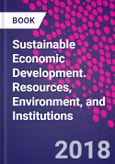Sustainable Economic Development: Resources, Environment, and Institutions presents 25 articles that lay the foundations of sustainable development in a way that facilitates effective policy design. The editors mix broad thematic papers with focused micro-papers, balancing theories with policy designs. The book begins with two sections on sustainable development principles and practice and on specific settings where sustainable development is practiced. Two more sections illuminate institutions, governance, and political economy. Additional sections cover sustainable development and agriculture, and risk and economic security, including disaster management. This rich source of information should appeal to any institution involved in development work, and to development practitioners grappling with an array of difficult on-the-ground developmental challenges.
Table of Contents
I. Introduction and Synthesis1. Principles and Practice of Sustainable Development Analysis: Overview and Synthesis 2. Reflections on the Foundations of Development Policy Analysis
II. Resources, Environment and Sustainable Development 3. Scarcity, Security and Sustainable Development 4. The Economics of Fossil Fuels and Pollution 5. Groundwater Economics 6. Optimal Joint Management of Interdependent Resources: Groundwater vs. Kiawe (Prosopis pallida) 7. Win-Win Solutions for Restoration and Maize Farming: A Case Study of Nan, Thailand
III. Institutions, Governance and Political Economy
8. The Role of Institutions in Natural Resource Use 9. Public Choice and the Generalized Resource Curse 10. Governance beyond Governments: A Multi-stakeholder Approach to Inclusive Commercial Agriculture in Africa 11. Land Confiscations and Land Reform in Natural-Order States 12. Regional Integration and Illicit Economy in Fragile Nations: Perspectives from Afghanistan and Myanmar 13. Corruption, Transactions Costs and Network Relationships: Governance Challenges for Thailand
IV. The Nature, Causes, and Consequences of Agricultural Development Policy
14. The Role of Agricultural Economists in Sustaining Bad Programs 15. Agricultural R&D Policy and Long-Run Food Security 16. Energy and Agriculture: Evolving Dynamics and Future Implications 17. Trends and Fluctuations in Agricultural Price Distortions 18. Getting the Price of Thai Rice Right: Episode II 19. Philippine Rice Self-sufficiency Program: Pitfalls and Remedies 20. Production Specialization and Market Participation of Smallholder Agricultural Households in Developing Countries
V. Development, Vulnerability and Poverty Reduction 21. Deviant Behavior: A Century of Philippine Industrialization 22. Bundling Drought Tolerance and Index Insurance to Reduce Rural Household Vulnerability to Drought
23. Have Natural Disasters Become Deadlier? 24. The Growth-Poverty Nexus: Multidimensional Poverty in the Philippines 25. Poverty Reduction and the Composition of Growth in the Mekong Economies








